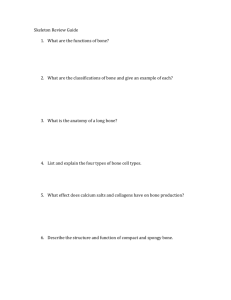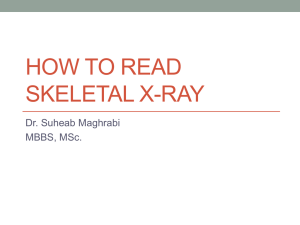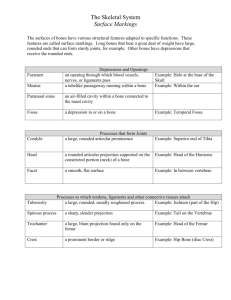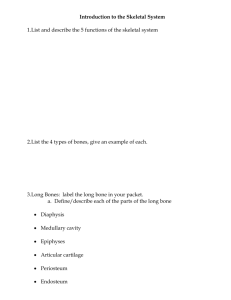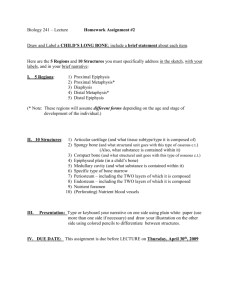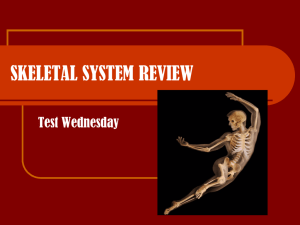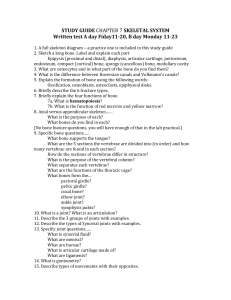Effects of Central and Peripheral Leptin on Bone
advertisement
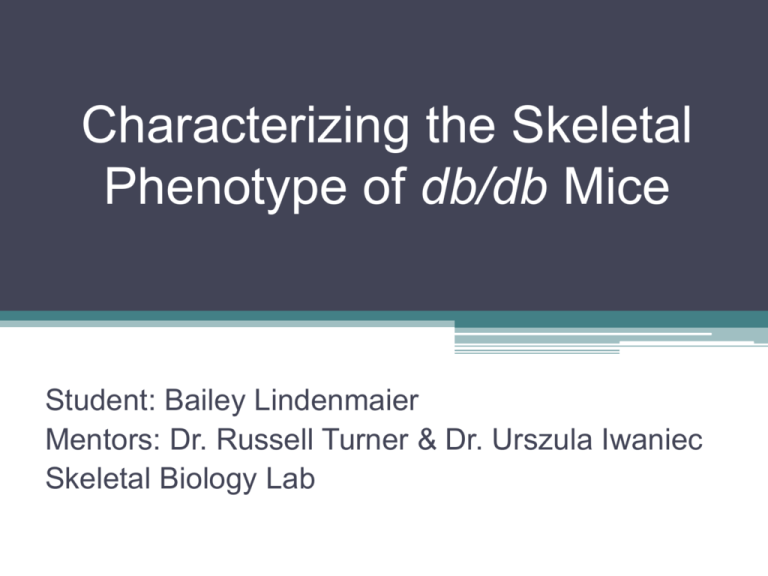
Characterizing the Skeletal Phenotype of db/db Mice Student: Bailey Lindenmaier Mentors: Dr. Russell Turner & Dr. Urszula Iwaniec Skeletal Biology Lab Introduction • Age related Osteoporosis- Porous bone • 1 in 3 women and 1 in 5 men over the age of 50 worldwide are estimated to have osteoporosis • In 2005, osteoporosis-related fractures were responsible for an estimated $19 billion in costs. • Health risks ▫ Increases individuals risk of fractures ▫ Following peak bone mass, lost bone mass is difficult to restore Leptin • Product of the OB gene • Primarily produced by adipose tissue. • Pleiotropic hormone ▫ Appetite control ▫ Energy regulation ▫ Immune response ▫ Cardiovascular and renal function • Essential for achieving optimal peak bone mass. Identifying the Mechanism of Leptin on Bone Remodeling • Leptin is a key hormone in regulating and maintaining healthy bones. • Early work suggests that s.c. leptin injection reduced bone loss following ovx. • Current data proposes that leptin functions via the CNS. • Osteoblast express leptin receptor. Possible peripheral affect? • Answers may lead to a generation of drugs to treat osteoporosis. Proposed Pathways of Leptin’s Effects on the Skeleton ObRb Receptor Leptin db/db mice • Loss of function in the leptin receptor • Mosaic skeletal type ▫ Overall reduced bone mass ▫ High cancellous bone mass of vertebrae. ▫ Low bone mass in femur. ▫ Decreased length of femoral bones. • Obese, hypogonadic, hyperinsulemic, hypercortisolic db/db Wild Type Goal Characterize skeletal growth of WT and leptin-deficient db/db mice. Study Design • A group of 10 WT and db/db mice sacrificed at 8 weeks for baseline. • A group of 7 WT and db/db mice sacrificed at 17 weeks. • Fed ad libitum, 12h light/dark cycle • Both femurs and LV 5 were excised at necropsy B6.BKS(D)-Leprdb µ CT Analysis • Micro - Computed Tomography • Fires an x-ray beam at a rotating specimen • Produces 3D images for structural measurements Bones Analyzed Vertebral Cancellous Bone Femoral cortex Femur Metaphysis (trabecular bone) Results Total Femur Bone Volume Femur Length 16 ANOVA Effects Genotype: p<.001 Age: p<.001 Genotype x Age: p<.002 19 18 Femur Bone Volume (mm 3) Femur Length (mm) 15 14 13 12 ANOVA Effects Genotype: p<.001 Age: p<.002 Genotype x Age: p<.004 17 16 15 14 13 12 11 11 10 0 10 0 WT ob/ob db/db 8 weeks WT ob/ob db/db 17 weeks WT db/db 8 weeks WT db/db 17 weeks Results Femur Cortical Thickness 210 200 Femur Cortical Thickness (µm) DiaphysisCortical Bone 190 180 ANOVA Effects Genotype: p<.001 Age: p<.001 Genotype x Age: p<.001 170 160 150 140 130 120 0110 100 WT 8 weeks ob/ob db/db WT ob/ob db/db 17 weeks Results 12 Metaphysis Bone Volume/Tissue Volume 11 Femur Metaphysis BV/TV (%) 10 ANOVA Effects Genotype: N.S Age: p<.001 Genotype x Age: p<.038 9 8 7 6 5 4 3 2 1 0 WT 8 weeks ob/ob db/db WT ob/ob db/db 17 weeks Results Lumbar Vertebrae 5 Bone Volume/Tissue Volume 25 24 Lumbar Vertebrae 5 BV/TV (%) 23 22 21 ANOVA Effects Genotype: p<.001 Age: p<.026 Genotype x Age: p<.007 20 19 18 17 16 15 14 13 12 0 WT ob/ob db/db 8 weeks WT ob/ob db/db 17 weeks Results Lumbar Vertebrae 5 Trabecular Thickness Lumbar Vertebrae 5 Trabecular Number 8 7 50 ANOVA Effects Genotype: p<.001 Age: p<.001 Genotype x Age: p<.004 Lumbar Vertebrae 5 Trabecular Thickness (µm)) Lumbar Vertebrae 5 Trabecular Number 9 6 5 4 3 2 1 49 48 47 ANOVA Effects Genotype: N.S Age: p<.001 Genotype x Age: N.S 46 45 44 43 42 41 40 39 38 37 36 0 WT db/db 8 weeks WT 17 weeks db/db 35 0 WT 8 weeks db/db WT 17 weeks db/db Conclusions • Aging db/db mice have high bone mass in their lumbar vertebrae ▫ Maintain trabecular number ▫ Increase in trabecular thickness • Aging db/db mice have low bone mass in their femur. ▫ Low cortical thickness ▫ Reduced femoral length On the Horizon • Histomorphometric analysis of bone. • Bone marrow transplantation following irradiation to determine if leptin has a direct effect on bone remodeling. Acknowledgements • • • • • • Dr. Russell Turner Urszula Iwaniec Dawn Olson Kenneth Philbrick Kevin Ahern Howard Hughes Medical Institute

